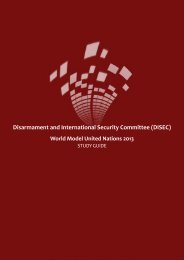Social, Humanitarian and Cultural Committee (SOCHUM)
Social, Humanitarian and Cultural Committee (SOCHUM)
Social, Humanitarian and Cultural Committee (SOCHUM)
You also want an ePaper? Increase the reach of your titles
YUMPU automatically turns print PDFs into web optimized ePapers that Google loves.
industry, like bed <strong>and</strong> breakfasts <strong>and</strong> restaurants, but<br />
the indigenous population is largely resistant. 143 When<br />
interviewed, they say that they are not interested in<br />
the market economy <strong>and</strong> just want enough food <strong>and</strong><br />
money for their expenses; what are most important to<br />
the Taroko people are their l<strong>and</strong> <strong>and</strong> their traditional<br />
lifestyles, which are unlikely to be returned to them in<br />
the near future. 144<br />
There are a number of indigenous organizations<br />
that have been fighting for local l<strong>and</strong> rights, most<br />
notably those in Latin America. In the 1990s,<br />
indigenous rights non-governmental organizations<br />
(NGOs) throughout the region made significant<br />
attempts to map, demarcate, <strong>and</strong> title the l<strong>and</strong>s of<br />
the indigenous populations. These efforts were fairly<br />
successful in certain parts of Colombia, Peru, <strong>and</strong><br />
Brazil, but they ran into resistance in other countries,<br />
like Chile <strong>and</strong> Argentina. Unfortunately, even in the<br />
countries where these efforts had some success, the<br />
indigenous populations did not win full l<strong>and</strong> rights. in<br />
many instances where these NGOs won indigenous<br />
titles to local l<strong>and</strong>s, the territories that were granted<br />
to the indigenous peoples did not cover all of the l<strong>and</strong><br />
that they utilized for their economic activities, leaving<br />
many in the same situation in which they began.<br />
Additionally, armed conflict in some countries, most<br />
notably Colombia, has forced indigenous populations<br />
off of their l<strong>and</strong>s, erasing any benefits they had won<br />
from gaining title to the l<strong>and</strong>. 145<br />
Limited progress has also been made in certain<br />
countries in rectifying past disregard for indigenous<br />
l<strong>and</strong>. A new l<strong>and</strong> policy in ug<strong>and</strong>a, for example,<br />
promises compensation for past <strong>and</strong> future l<strong>and</strong><br />
seizures, though the exact method <strong>and</strong> amount of<br />
compensation have yet to be determined. This new<br />
l<strong>and</strong> policy also seeks to increase indigenous l<strong>and</strong><br />
ownership by simplifying the process for members of<br />
indigenous communities to apply to gain official title<br />
for the l<strong>and</strong>. this l<strong>and</strong> policy has not yet passed the<br />
Ug<strong>and</strong>a legislature, however. 146 Nevertheless, this<br />
first step gives hope that governments in the future<br />
will take indigenous l<strong>and</strong> rights into account when<br />
determining national policy.<br />
Some suggest that the international community<br />
should not focus on local l<strong>and</strong> rights when seeking<br />
to improve the economic situation of indigenous<br />
peoples. Roger Riddell, for example, argues that<br />
so many indigenous people have already forsaken<br />
their ancestral l<strong>and</strong>s <strong>and</strong> traditional occupations<br />
for urban life <strong>and</strong> employment <strong>and</strong> that our efforts<br />
should primarily attempt to help indigenous migrants<br />
in those urban locations. 147 The reason, however,<br />
that so many indigenous people have migrated to<br />
urban areas at an increasingly rapid pace is that they<br />
have been forced off of their ancestral l<strong>and</strong>s or that,<br />
because of the global economy, they are unable to<br />
subsist on these l<strong>and</strong>s alone. If the international<br />
community works to protect indigenous l<strong>and</strong>s <strong>and</strong><br />
make them viable for economic subsistence, then the<br />
problem of indigenous populations in urban areas will<br />
lessen.<br />
Lack of Indigenous Civic Participation<br />
One of the major problems that anthropologists<br />
<strong>and</strong> activists have discovered with previous failed<br />
attempts to assist the economic <strong>and</strong> human<br />
development of indigenous peoples is the lack of<br />
participation by indigenous peoples in the drafting<br />
<strong>and</strong> debate of plans that are intended to assist them.<br />
When indigenous populations are excluded from<br />
the development discussion, subsequent policies<br />
either fail to recognize their interests at all or initiate<br />
action that is harmful to them. Policies that promote<br />
general economic growth, which primarily affect<br />
the wealthy <strong>and</strong> the majority ethnic population, are<br />
different from those that assist the development<br />
of indigenous populations, but many poverty<br />
reduction strategies do not make this distinction<br />
<strong>and</strong> only involve plans to increase general growth. 148<br />
37<br />
Melbourne Host Directorate PTY LTD | Office of Media <strong>and</strong> Design

















